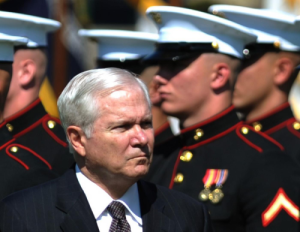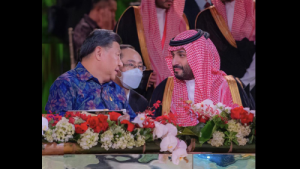By Marco Carnelos.

By invading Iraq in 2003, the US had ambitions to reshape the Middle East. Two decades later, it is the Middle East that has reshaped perceptions of US power in the world.
Sooner or later, every country meets its own Suez moment as far as its global ambitions are concerned.
In 1956, for the UK, this moment lasted barely ten days. For the last global empire, the United States, it has been ongoing since it suddenly withdrew from Afghanistan in 2021, marking the end of the US’s disastrous post-9/11 interventions, culminating with the invasion of Iraq 20 years ago today.
The Iraq war officially ended in 2011, but its impact still reverberates around the world.
Nothing since the Vietnam War in the 20th century has so much tarnished the US’s image and reputation. Both wars were built upon deceit and mistaken assumptions: Vietnam on the Tonkin Gulf incident and the later discredited domino theory; Iraq on non-existent weapons of mass destruction and on the failed promise to export democracy to the Middle East.
By invading Iraq in 2003, the US had ambitions to reshape the Middle East. Twenty years later, it is the Middle East that has reshaped the perception of American power in the world.
The global war against terrorism triggered by the 11 September attacks led to the conflicts in Afghanistan, which started in October 2001, and Iraq, in March 2003. The conflict occurred within a wider political context, which later became known as the endless wars in western Asia.
The war on terror is still ongoing, with the extensive use of drones to target alleged militants anywhere in the world, irrespective of international law. After two decades, US troops ingloriously exited Afghanistan. A few thousand US soldiers remain in Iraq, although its parliament voted them out three years ago after the US killed Iran’s Qassem Soleimani at Baghdad airport.
Three questions
The debate about the Iraq war’s 20th anniversary can be essentially reduced to three questions.
Were Iraq, and the other endless wars, worth it? Definitely not. After 20 years, Afghanistan is again ruled by the Taliban, Iraq is a dysfunctional democracy, and terrorism was weakened but did not disappear.
Was the price paid justified? The negative answer here is even louder. Brown University’s Cost of War Project has provided staggering figures about the endless wars’ cost between 2001 and 2021. Almost one million people have died due to direct war violence; 387,000 civilians have been killed because of the fighting (300,000 in Iraq alone), and 38 million people are displaced war refugees in the region. The US government spent $8 trillion, and 7,050 of its soldiers were killed.
Has any lesson been learned from this immense tragedy? Unsurprisingly, the answer is once again negative. Twenty years later, most of the endless wars’ cheerleaders are still listened to. This ensures that the war in Ukraine will likely continue until there is a complete defeat of Russia. China seems to be their next target, with Taiwan as a casus belli.
Those who built the case for the Iraq war on fake intelligence and caused so many casualties have not served one single day in jail. Those who instead denounced the conflict’s war crimes, like Julian Assange, are in solitary confinement and risk a life sentence.
Such an absurd paradox is taking place under the shameful, deafening silence of the mainstream media.
The same blueprint used between 2002 and 2003 to build the case for the Iraq war is now being repeated about China. A disquieting bipartisan consensus in Washington is portraying China and its leader in the same Manichean terms used against Saddam Hussein and Iraq. The political lexicon is identical, while the level of hysteria among politicians and media has become disconcerting. The ultimate proof was provided by the ludicrous reactions to the recent balloon affair.
These two-decades-long policies are advocated by those who claim to believe in a rules-based world order. It is now claimed that we are in a watershed moment, where democracy is under attack by autocracy. This is nonsense. The inconvenient truth is that western democracies are being devoured from within by their hypocrisy.

Op-ed by former defence secretary Robert Gates exemplifies the follies of the US foreign policy and security establishment.
READ: Has the US developed an immunity to critical thinking?
Groupthink
The US political establishment has learned nothing from this sad chapter of 21st-century history. The groupthink at play 20 years ago is still alive and kicking. Any crisis is turned into a zero-sum game. Manichean views are the norm not the exception. Negotiation and diplomacy have become forbidden words.
Hegel’s immortal conclusion, “We learn from history that we do not learn from history” has been once again reconfirmed.
The Iraqi people have been the main victims of this catastrophe. Before the 2003 invasion, Iraq had already endured a ruthless dictatorship, a long bloody war against Iran in the 1980s, the partial invasion of their country by a US-led international coalition in 1991, followed by a decade of harsh sanctions.
Those same sanctions caused the death of up to 500,000 Iraqi children. The former US Secretary of State Madeleine Albright – whose recent death has been widely and emotionally commemorated – was able to say that such a “price was worth it”.
The 2003 war tore Iraqi society apart and led to the collapse of the Iraqi state. It also led to sectarian divisions and a breakdown in the social order, which is still felt today.
The war had a ripple effect across the Middle East, contributing to the Arab Spring uprisings and the ongoing conflict in Syria. It also led to the most fearsome political-religious experiment ever attempted in an Islamic society: the so-called Islamic State of Iraq and Sham, better known as the Islamic State (IS) group.
Iraq is still grappling with the consequences of the war, including political instability, sectarian violence and a struggling economy. The country continues to face challenges in rebuilding its infrastructure and institutions and addressing the needs of its people.
Rarely has an Arab country been crushed by so much violence and destruction as Iraq has over the last four decades. Probably only Afghanistan, and today’s war-ravaged Yemen and Syria, get close to such an unbelievable ordeal.
Rise of China
The 2003 conflict and its aftermath sent shockwaves through the region. Some Arab countries, Russia, a few EU members and honest western experts attempted to warn Washington (and London) about the huge unintended consequences that a regime change in Iraq could imply for the regional power balance. To no avail.
Today, Washington’s traditional allies in the Gulf are looking for better options elsewhere, and even the relationship with Israel is in troubled waters. China – without any military footprint, sanctions and threats – is apparently achieving better results and raising its standing in the region.
In normal times, these dismaying results would have determined a comprehensive reassessment of US foreign policy. Do not count on that happening now.
Washington’s foreign policy and security establishment (aka the Blob) is not ready to review any of its mindsets and assumptions. China’s recent diplomatic success in helping end the Iranian-Saudi rift will not lead the US to reassess.
As presciently observed by Fareed Zakaria in the Washington Post, “Washington has lost the flexibility and suppleness” that allowed the US to win the Cold War. Its foreign policy is locked into lecturing and grand moral declarations supported by sanctions and military threats. The political atmosphere is made so charged that merely talking with a “foe” becomes risky.
It seems like a mentally caged policy. Washington’s Blob appears to be in the grip of “herd immunity” to critical thinking. Its policy is alienating far more hearts and minds around the world than it can win. No effort at all is spent on cognitive empathy, ie understanding the other side’s views, in order to give better chances to diplomacy and negotiation.
Zakaria correctly portrays such a dismaying situation as “the inertia of an ageing empire… run by an insular elite that operates by mouthing rhetoric to please domestic constituencies – and seems unable to sense that the world out there is changing, and fast”.
Even the fact that Zakaria’s extraordinary analysis was hosted by the mainstream of the mainstreamers, the Washington Post, is not enough, at least from this modest observatory, to induce a cautious optimism; and neither was a similar wake-up call that renowned historian Max Hastings raised in another mainstream media outlet.
Middle East Eye’s regular readers will know how many critical articles I wrote against Donald Trump’s foreign policy. I never imagined that I would desire his return to the White House just for the tenuous hope that it might inspire a long-overdue change in US foreign policy.

Deal brokered by Beijing could be followed by more success stories across the region, presenting a slap in the face to Washington’s failed policies.
READ: Saudi-Iran pact: China’s diplomatic coup puts US on notice in Middle East
Source: Middle East Eye. 22 March 2023.